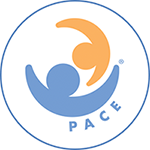
Expressive Language

Date Published: April 13, 2023
Author: Leah Persing, M.S., CCC SLP, PACE Speech-Language Pathologist
Expressive language is how a person communicates with others. Building expressive language skills helps individuals grow their independence and self-advocacy skills. Below are some tips on how you can support someone’s expressive language skills.
Wait! Before asking more questions or moving on, first try counting to ten in your head. If they still haven’t responded, then consider restating or rewording what you said.
Create opportunities for your child to communicate.
Where you might traditionally anticipate your child’s needs by giving them a favorite snack, wait and see if they take that opportunity to ask.
When your child says something (with either their voice, a gesture, or a communication device), celebrate it and expand on it by adding one more word to that statement. For example, if your child says “car,” you can expand on that word by saying “red car,” or “car go.”
Children learn through imitation, so provide your child with opportunities to imitate by modeling language throughout your daily routines. When your child primarily uses their voice, model with your voice. When your child primarily uses an AAC device, model on that device!
Don’t forget – communication is fun! Try to encourage language through play and activities that your child enjoys.
Additional Resources:
Expressive communication skills are forms of verbal and nonverbal behavior that a child uses to express their needs, wants, feelings and preferences in a way that others can understand them. In this module, you will learn about visual communication systems and how you can use these with your child to improve their ability to communicate with you and with others. To learn more about Visual Communication Systems, visit porchlighteducation.org/visual-communication-systems/
Our Porchlight Education Autism Series also offers the following:
About the Author:
Leah Persing is a Speech-Language Pathologist (SLP) on the PACE School Therapy Department team. PACE School is a non-profit, non-public school, certified by the California Department of Education and accredited by the Western Association of Schools and Colleges. PACE School serves students ages 6-22 who live with moderate to severe Autism, with a specific emphasis on non-verbal students and those with especially challenging behaviors and communication disorders.
Disclaimer: “Keeping Up the PACE” is a blog operated by Pacific Autism Center for Education with information provided by professional therapists. This content is not intended for the purpose of diagnosis of any condition. If you have a question for our team, please email us at email hidden; JavaScript is required.

